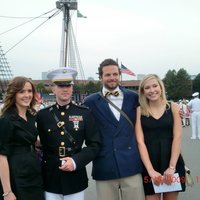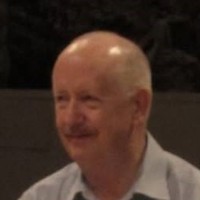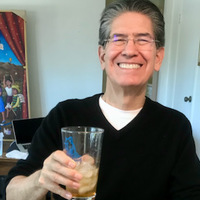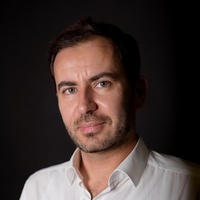
Abram Trosky
Dr. Abram Trosky is Associate Professor of Applied Communication in the Applied Communication & Learning Laboratory of the U.S. Army War College. He develops curriculum and leads classes that help refine skills in ethical reasoning and critical thinking; Socratic discussion facilitation and argumentation; and verbal, nonverbal, visual, and written communication for students and faculty across USAWC’s Schools, Centers, Institutions, and Residential, Distance, and Certificate Education Programs.
Since co-establishing the ACL Lab in 2019, Trosky has played a central role in developing USAWC’s Writing Program which assists students and faculty in assessing and addressing graduate and strategic-level communication skills through online and in-person classes, coaching, and workshops. Within months of arriving, he pioneered a program in social media literacy and short-form policy and persuasive writing, Online Presence and Publication for Strategic Leaders, that has resulted in over 50 publications by civilian and military professionals in the Resident Education Program. His data literacy, visualization, and storytelling curricula have now expanded to include primers in using and citing generative AI in the research and writing process.
Before coming to USAWC, Dr. Trosky was academic staff in the Office of Justice, Equity, and Transformation and Lecturer in Politics and Public Law in the Massachusetts Public College and University system. Prior to that, he trained future law enforcement and military officers as Lecturer in Ethics and American Government at the U.S. Coast Guard Academy. Dr. Trosky’s interdisciplinary research critically applies moral and political philosophy to the formation, communication, and reception of law and foreign policymaking. The author of twenty publications and a frequent presenter and discussant for a variety of professional associations, Trosky’s recent editorial credits include Protracted War with the People’s Liberation Army, winner of the Vice Chairman of the Joint Chiefs of Staff and Deputy Secretary of Defense’s J7 Research Challenge to be published with USAWC Press, and a contribution to Springer’s series Optimization and Its Applications with the working title “Hybrid Warfare, the Escalation Paradox, and Manmade Disasters in the Anthropocene.”
Supervisors: Dr. Judith Swanson, Dr. Kathleen Malley-Morrison, Dr. Douglas Kriner, Dr. Andrew Bacevich, and Dr. David Mayers
Since co-establishing the ACL Lab in 2019, Trosky has played a central role in developing USAWC’s Writing Program which assists students and faculty in assessing and addressing graduate and strategic-level communication skills through online and in-person classes, coaching, and workshops. Within months of arriving, he pioneered a program in social media literacy and short-form policy and persuasive writing, Online Presence and Publication for Strategic Leaders, that has resulted in over 50 publications by civilian and military professionals in the Resident Education Program. His data literacy, visualization, and storytelling curricula have now expanded to include primers in using and citing generative AI in the research and writing process.
Before coming to USAWC, Dr. Trosky was academic staff in the Office of Justice, Equity, and Transformation and Lecturer in Politics and Public Law in the Massachusetts Public College and University system. Prior to that, he trained future law enforcement and military officers as Lecturer in Ethics and American Government at the U.S. Coast Guard Academy. Dr. Trosky’s interdisciplinary research critically applies moral and political philosophy to the formation, communication, and reception of law and foreign policymaking. The author of twenty publications and a frequent presenter and discussant for a variety of professional associations, Trosky’s recent editorial credits include Protracted War with the People’s Liberation Army, winner of the Vice Chairman of the Joint Chiefs of Staff and Deputy Secretary of Defense’s J7 Research Challenge to be published with USAWC Press, and a contribution to Springer’s series Optimization and Its Applications with the working title “Hybrid Warfare, the Escalation Paradox, and Manmade Disasters in the Anthropocene.”
Supervisors: Dr. Judith Swanson, Dr. Kathleen Malley-Morrison, Dr. Douglas Kriner, Dr. Andrew Bacevich, and Dr. David Mayers
less
Related Authors
Bill Bowring
Birkbeck College, University of London
Andreas Umland
National University of "Kyiv-Mohyla Academy"
Don Ross
University College Cork
Otto Santa Ana
University of California, Los Angeles
Charis Psaltis
University of Cyprus
Brian Leiter
University of Chicago
Remo Caponi
University of Cologne
Ozan Ozavci
Utrecht University
Carla Bagnoli
Università degli studi di Modena e Reggio Emilia
Armando Marques-Guedes
UNL - New University of Lisbon
InterestsView All (22)










Uploads
Books and Chapters by Abram Trosky
This chapter explores the tensions at the heart of the story, reaction to it, and perhaps political philosophy itself: the urban/rural divide; the putative need for myth and sacrifice to effect and maintain social cohesion; and the challenges and temptations that culturally-embedded creatures face in introducing more individualistic or cosmopolitan narratives. Jackson’s inclusion of a character “Bentham” in The Lottery provides opportunity to examine the utilitarian tradeoffs in both scenarios: the conservative insistence that the greater good depends on the preservation of hard-fought community identity, and liberal ambivalence regarding social costs and means of improvement. It concludes with a primer on Kantian deontology that highlights the contrast with contemporary moral and legal sensibilities.
Papers by Abram Trosky
A great deal of psychological theory and research focuses on the construction and deconstruction of justifications, with much of this work documenting the ways in which justifications can be self-serving (Wolff & Moser, 2008; Gino & Ariely, 2012), group-serving (Sidanius & Pratto, 1999), or system-serving (Jost & Banaji, 1994; Shepherd & Kay, 2012; Day, Kay, Holmes, & Napier, 2011). The emancipatory potential of critical psychology’s contribution lies not only in critique of ego-justification and social dominance, but in championing the more empathic principles that ground authentic justification and the values of pluralism and inclusivity.
Book Reviews by Abram Trosky
This chapter explores the tensions at the heart of the story, reaction to it, and perhaps political philosophy itself: the urban/rural divide; the putative need for myth and sacrifice to effect and maintain social cohesion; and the challenges and temptations that culturally-embedded creatures face in introducing more individualistic or cosmopolitan narratives. Jackson’s inclusion of a character “Bentham” in The Lottery provides opportunity to examine the utilitarian tradeoffs in both scenarios: the conservative insistence that the greater good depends on the preservation of hard-fought community identity, and liberal ambivalence regarding social costs and means of improvement. It concludes with a primer on Kantian deontology that highlights the contrast with contemporary moral and legal sensibilities.
A great deal of psychological theory and research focuses on the construction and deconstruction of justifications, with much of this work documenting the ways in which justifications can be self-serving (Wolff & Moser, 2008; Gino & Ariely, 2012), group-serving (Sidanius & Pratto, 1999), or system-serving (Jost & Banaji, 1994; Shepherd & Kay, 2012; Day, Kay, Holmes, & Napier, 2011). The emancipatory potential of critical psychology’s contribution lies not only in critique of ego-justification and social dominance, but in championing the more empathic principles that ground authentic justification and the values of pluralism and inclusivity.
Identifying ‘the good’ with the practice and promotion of humane, pro-social values, as many in critical fields wish, makes the vocation of teaching an unavoidably normative activity. How a teacher teaches, I argue, is as important in communicating this normative dimension of liberal citizenship, as the content. Across disciplines, descriptive similarities in how people are persuaded have prescriptive implications for teachers of philosophy, political theory, ethics, and, more controversially, history.
Citing former teachers of my own, from Howard Zinn to Elie Wiesel, I conclude by showing how the study of history is emblematic of the goal of the liberal arts generally: the study of meaning and its use to the living, all of us. On this view, education can be seen as a sort of technology for self- and collective improvement, which is itself governed by nonrelative principles of justice.